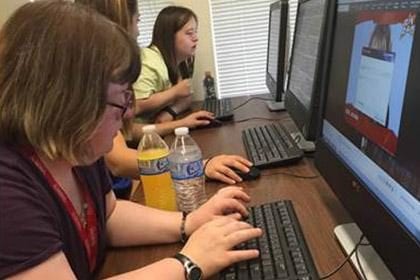
Cross Over to Independence
Published: March 1, 2017
By: Lori Chandler Pruitt
Every young person likes to envision their future. For those with special needs, that process can seem daunting – but the CrossingPoints program is doing its part to help that transition from school easier, in a way that builds confidence and independence.
CrossingPoints, housed on the University of Alabama campus, is a student transition program that began in 2002 and is funded in part by a five-year grant by the Office of Postsecondary Programs of the U.S. Department of Education.
CrossingPoints offers two different programs that serve special needs students. “They learn so much about themselves, and gain independence from family and caretakers in order to make decisions for themselves,” says Dr. Jim Siders, CrossingPoints internal administrative liaison.
The first program, Tier 1, is a collaboration between UA, Tuscaloosa City Schools and Tuscaloosa County Schools. Eligible students in those school systems with significant disabilities ages 18-21 follow a transition curriculum, “Life Center Career Education,” which includes daily living skills, personal social skills, occupational guidance and preparation. All of these components help students make informed choices about their future. Students in Tier 1 are recommended by the partnering school systems.
“There is a huge emphasis on employment outcome in Tier 1,” says Dr. Kagendo Mutua, CrossingPoints director and professor of severe and profound disabilities and transition in the department of special education and multiple abilities in the UA College of Education. “These students may not necessarily be college bound in the traditional way, but they will acquire the skills they need to gain employment. We can help them in an age-appropriate setting. This past year, all our program graduates were employed.”
The second program, Tier 2, is called the Summer Bridge Program and provides students 19 and older with intellectual disabilities a structured opportunity to experience, explore and develop skills for pursuing postsecondary education. Held during June and July, students, who apply from all over Alabama and other states, live in UA dorms and participate in a curriculum blend of CrossingPoints-specific courses and can select up to two UA courses based on eligibility and interests. The students must be formerly eligible for special education services who want to pursue postsecondary education.
Tier 2 typically has about 10 students who live in the dorms. Graduate and undergraduate students serve as mentors, to work with participants in all facets of the program, from classes to community work and entertainment excursions. “Our mentors help infuse our participation in the fabric of the community of what UA is all about,” Mutua says. The university provides space and personnel, and there is a lot of community support. That is a huge components. We have excellent support through fundraisers and other events.”
CrossingPoints recently received a $2.5 million grant to help expand the program to provide more transition services. “Once these students graduate from public schools, their network of resources almost evaporates,” Siders says. “Our goal is to pipeline students enrolled in our summer program to meet their goals, and to have a follow-up program for them as well.”
There is a national certification program that some other universities have completed that helps students with intellectual disabilities enter post-secondary education, with follow-up support and resources, Mutua says. Federal law now allows for students with selected disabilities to enroll in college. “For some of our students, college is an option, where it has not been an option before,” she says. “Our goal is always to help them realize their goals.”
CrossingPoints also welcomes volunteers also. For more information, call 205-348-3180 or go to http://crossingpoints.ua.edu.
Lori Pruitt is associate editor of Birmingham Parent.
